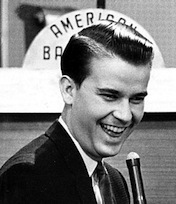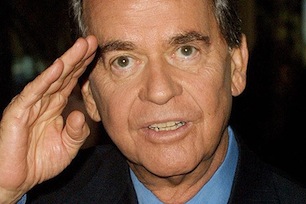R.I.P. Dick Clark: Nov. 30, 1929 to April 18, 2012
04/18/12 06:29 PM


By ED BARK
No one gets out alive, not even the man known for most of his adult life as "America's Oldest Teenager."
Dick Clark died Wednesday at age 82 of a heart attack. And no one wants to dance to that beat.
Clark's principal legacies are American Bandstand, a staple of teen life in the 1950s and '60s, and the New Year's Rockin' Eve specials that dated to Dec. 31, 1972 and have continued with the part-time presence of Clark after a 2004 stroke forced him to yield the main hosting duties to his modern day equivalent, Ryan Seacrest.
His production company also churned out a wealth of game shows (most notably Pyramid with varying cash values); trophy fests (The Golden Globes and the American Music Awards); the TV Bloopers & Practical Jokes series; and numerous made-for-TV movies, some of which proved to be landmarks.
Clark and his company were behind ABC's 1979 three-hour Elvis movie. It starred Kurt Russell and on the night of Feb. 2nd went up against Gone with the Wind on CBS and One Flew Over the Cuckoo's Nest on NBC. No one gave Elvis a chance but it thumped the two feature films in the Nielsen ratings and spurred a big boom in production of made-for-TV movies and miniseries.
Dick Clark Productions also made the 1981 NBC miniseries Murder In Texas, a true crime blockbuster that also made a respectable actress of Farrah Fawcett and earned Andy Griffith his first and still only Emmy nomination.
Earlier, in 1968 alone, he produced a quartet of B-side feature films -- Killers Three, The Savage Seven, Wild in the Streets and Psych-Out. The latter starred Jack Nicholson as a pony-tailed rock band leader.
Clark also is the only person enshrined in both the Rock 'n' Roll Hall of Fame and the Academy of Television Arts & Sciences Hall of Fame. But he's never been among the Kennedy Center honorees, a major oversight in life and now death.
Born Richard Wagstaff Clark in Mount Vernon, NY, Clark's first TV job was as host of Cactus Dick and the Santa Fe Riders in 1951 for KKTV-TV in Utica, NY. He got the Bandstand gig in 1956 after the incumbent host was jailed for drunk driving. The show originally aired on WFIL-TV in Philadelphia before going national on ABC in 1957.
The Bandstand years implanted Clark firmly on the television map. But younger viewers primarily know him for those annual Rockin' Eve specials. The first one aired on NBC, which wanted a hip alternative to CBS' Guy Lombardo/Waldorf Astoria festivities.
I last talked to Clark in late 2001. It was a telephone interview tied to the 30th anniversary of the Rockin' Eve specials. The very first one included performances by Three Dog Night, Helen Reddy and "oh God, I can't remember who else," Clark said. "I think Billy Preston was on that show, and I was in New York in Times Square. So it was the same sort of potpourri of people. the truth is, this show hasn't changed an iota."
"We've built what in television-land they call a 'franchise,' " he added. "Dick Clark and New Year's Eve are synonymous now. It's a little odd, but we've become sort of dates. Some people are alone and some are at parties. But there's good ol' Dick and the ball drop."
NBC carried Rockin' Eve until the 1973 telecast, when NBC's ironclad contractual commitment to carry Johnny Carson's Tonight Show sent Clark looking for a new network. ABC has aired it ever since, save for the big 1999 millennium blowout by the network's news department. It knocked Rockin' Eve out of the box, with Clark showing up only for his signature Times Square countdown. But the following year's Rockin' Eve came back in full force and hit its highest ratings ever, Clark noted. "That's what made it so sweet. That's so tasty."
The 30th anniversary edition aired just several months after the Sept. 11, 2001 terrorist attacks, a subject that Clark didn't care to dwell on during our interview.
"I was born in New York," he said. "New Yorkers are very resilient people. There was a time when people said, 'Ah, New York, those people are cold. They're mean.' Now they're looked upon as a unique kind of dog. Everybody loves New Yorkers now, and I anticipate that New Year's Eve in Times Square will be a very festive occasion. At the same time we'll all be thinking about what happened on Sept. 11 and we'll be looking forward to the future."
Clark prided himself on being current, booking whatever acts were hot at the time even if he at times had to swallow hard or perhaps even gulp. The 30th anniversary edition of Rockin' Eve included Busta Rhymes singing his crossover hit "Break Ya Neck."
"It's a natural curiosity," he said of going with the flow. "I voraciously read all the trade papers. I just happen to love the entertainment business. And if you were a doctor who loves his profession, you'd be up on all the new things, too."
Despite his youthful, gregarious persona on-camera, Clark survived as a hard-driving businessman who cut new deals while also keeping what he already had. It got harder, though.
"Big corporations have taken over everything," he lamented a little over a decade ago. "And they don't want to pay you and they want all the rights. The government allowed this, so now we have to survive on unique things that we've created or somehow have grandfathered in."
Clark once matter-of-factly told an interviewer that "I don't make culture. I sell it."
"I made that quote 20-some years ago," he recalled. "I would have said it a little more politely if I had known it would be used this much. To put it in a warmer, fuzzier way, people say to me all the time, 'Thanks for being a part of my life.' And that's kind of nice."
He already had been iconic for decades when we talked in late 2001. And Clark was pretty much OK with that.
"Here, here, let's not forget 'legend,' " he said, laughing. "Yeah, well, what it causes people to do is call me 'Mr. Clark' instead of 'Dick' sometimes. That's a little frightening."
You'll be missed, Mr. Clark. But your beat will go on.
